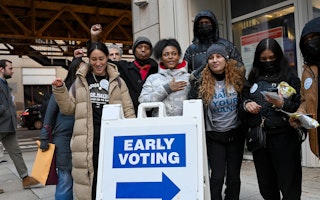All but two states (Maine and Vermont) have felony disenfranchisement laws. This means that those convicted of felonies can't vote regardless of how long they have been out of prison or released from the overall criminal justice system. Consequently, nearly four million U.S. citizens, including 13 percent of all African-American men, cannot participate in the democratic process. Such a widespread ban has muted the political voice of many communities and limited their ability to participate fully in Americian society.
Over the past five years, however, extensive grassroots efforts have led to changes in several states' laws that have restored voting rights to half a million ex-prisoners. Public opinion is now on the reformers' side; a 2002 Harris Poll reported that 80 percent of Americans support ex-prisoners voting and more than 60 percent support the right to vote of citizens on probation and parole.
The OSI Forum "Mass Imprisonment and the Disappearing Voters" focused on the impact of felony disenfranchisement laws in the United States. Moderated by Marc Mauer assistant director of The Sentencing Project and editor of the book, Invisible Punishment: The Collateral Consequences of Mass Imprisonment a panel of criminal and social justice experts debated the issue of mass imprisonment and whether people convicted of felonies who have served their time should have the right to vote.
Read more
Online Hate Speech
New SEC Complaint Says Meta Misled Shareholders over Myanmar Hate

A whistleblower complaint to the SEC argues that the social media giant Meta misrepresented its role in fueling violence against Myanmar’s Rohingya—highlighting the need for more platform accountability for online hate.
Civic Engagement
Bolstering Women and Youth, Linchpins of Democracy

Philanthropy has historically underfunded women and youth. Open Society’s new $50 million investment in their engagement addresses that imbalance—and builds on recent surges in civic engagement crucial to the future of American democracy.
Art and Activism
Reimagining January 6th

The insurrection at the U.S. Capitol left him in a cold sweat. Creating a comic book seemed like one way to reach people not obsessively following the news and spark activism to help defend a multicultural democracy.